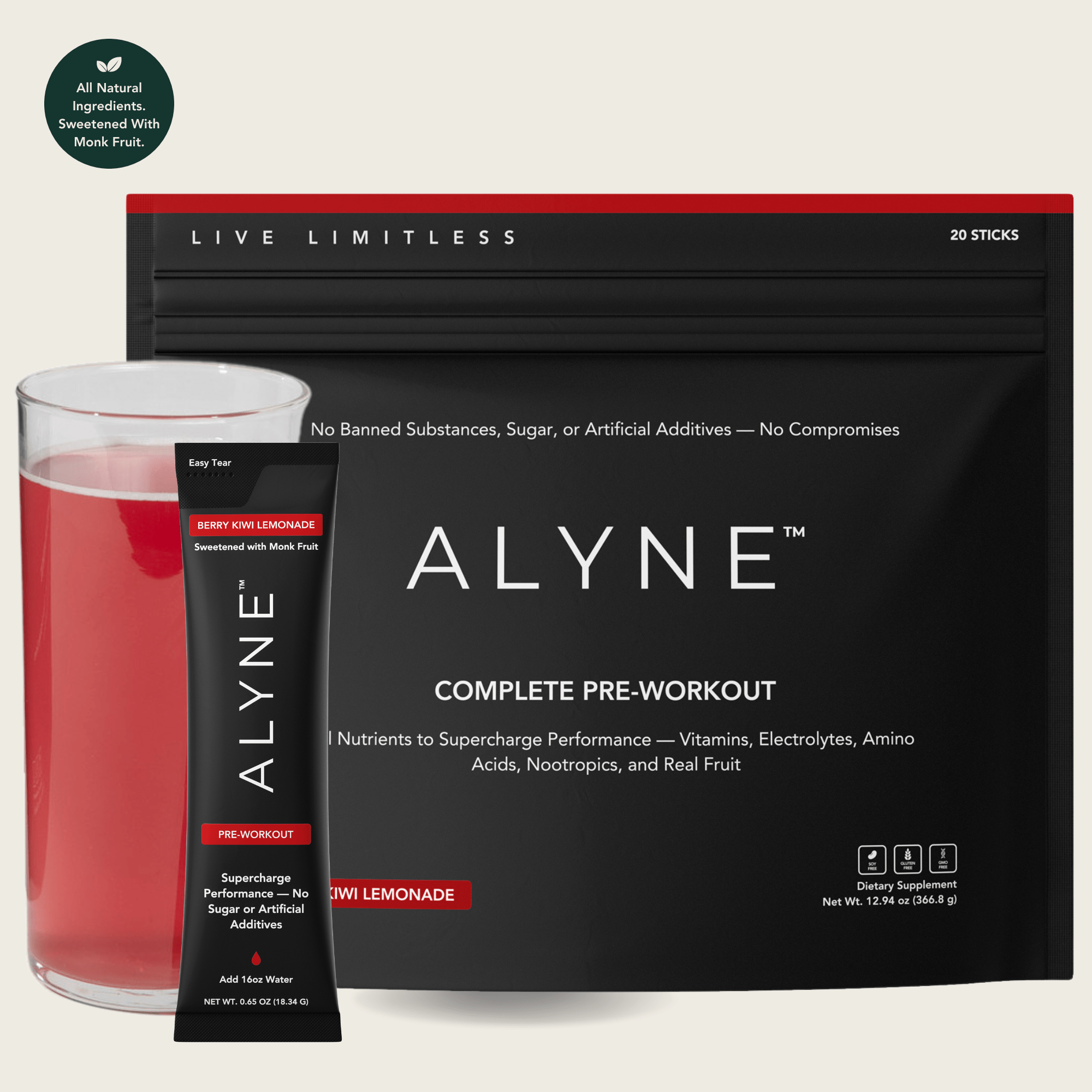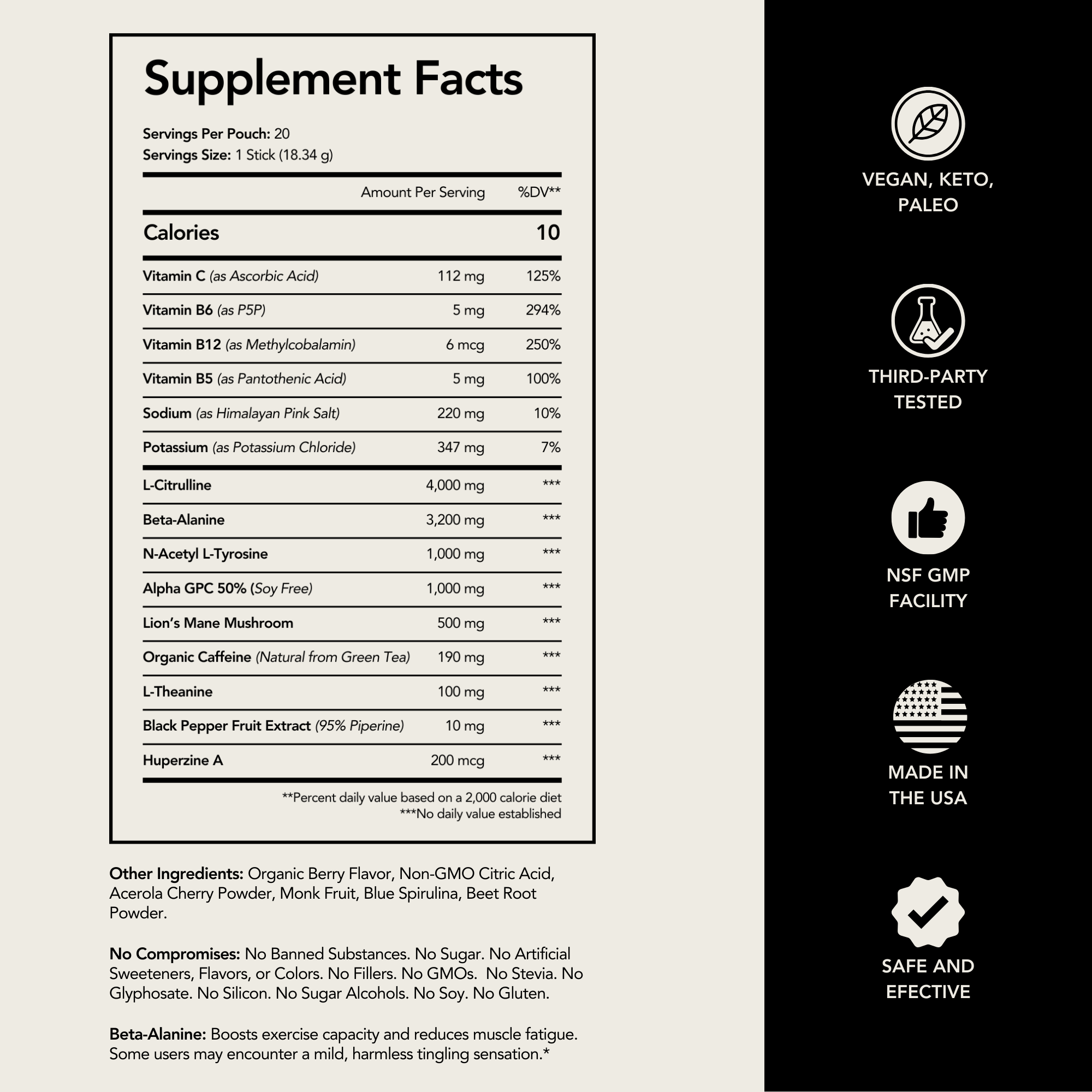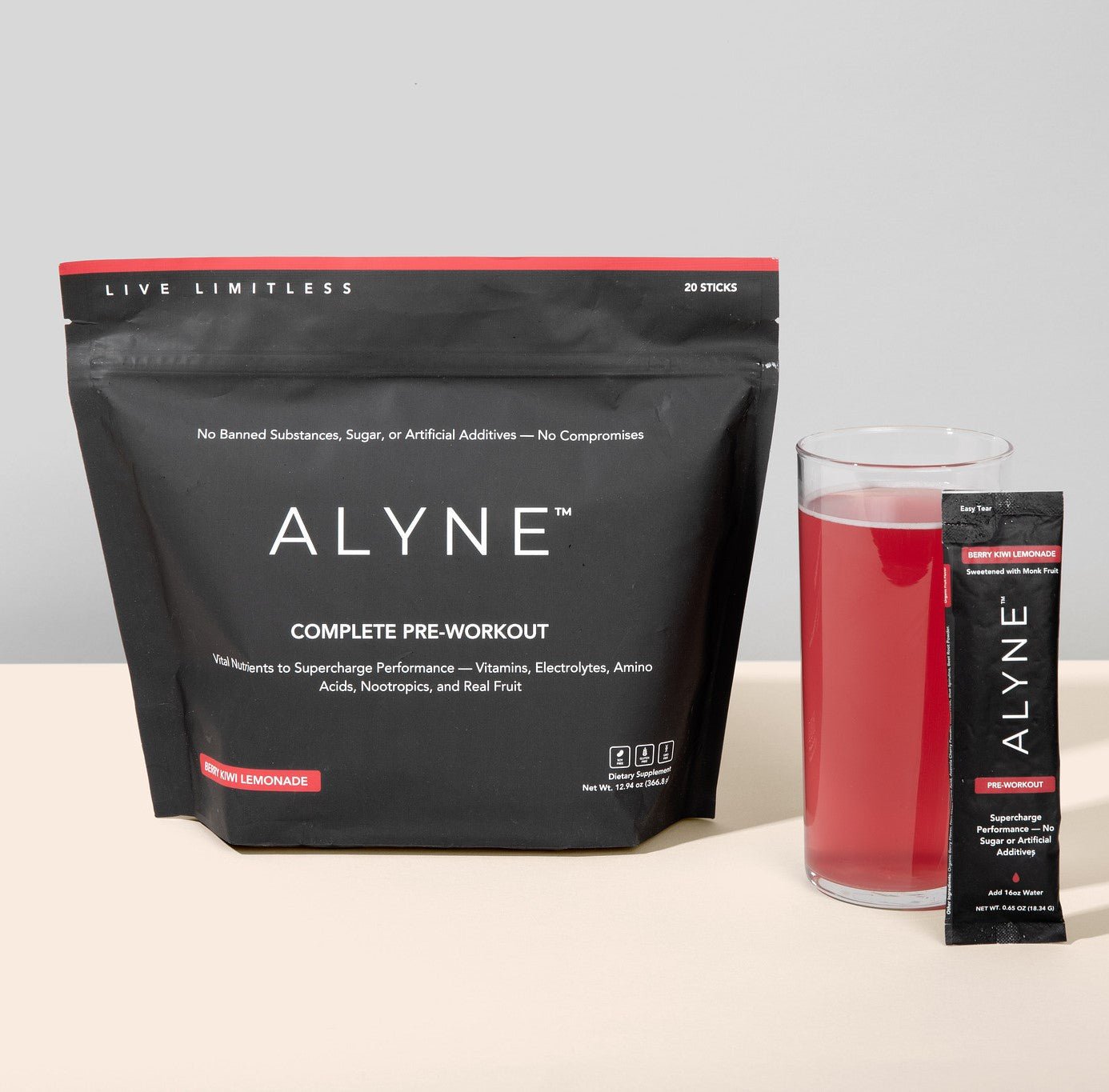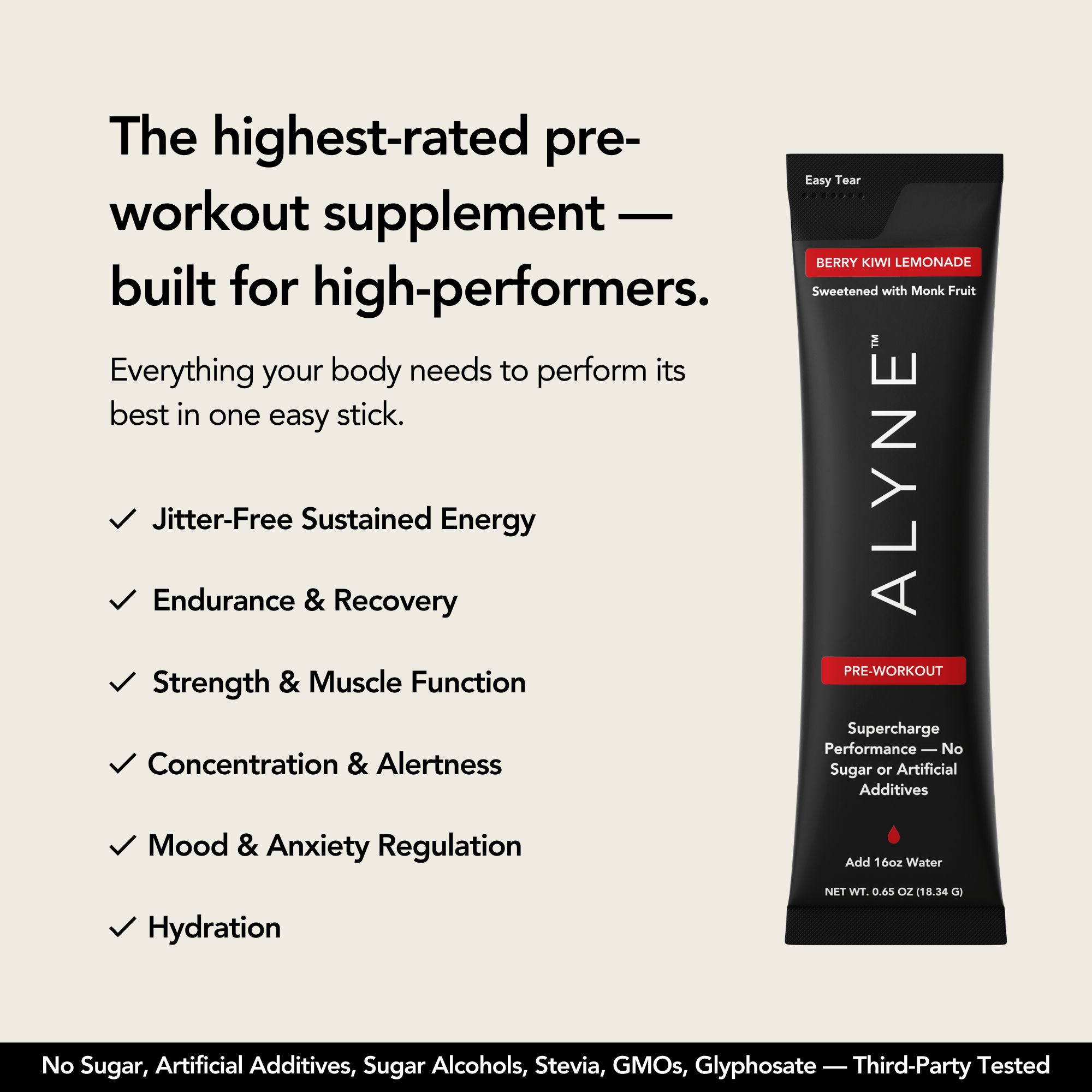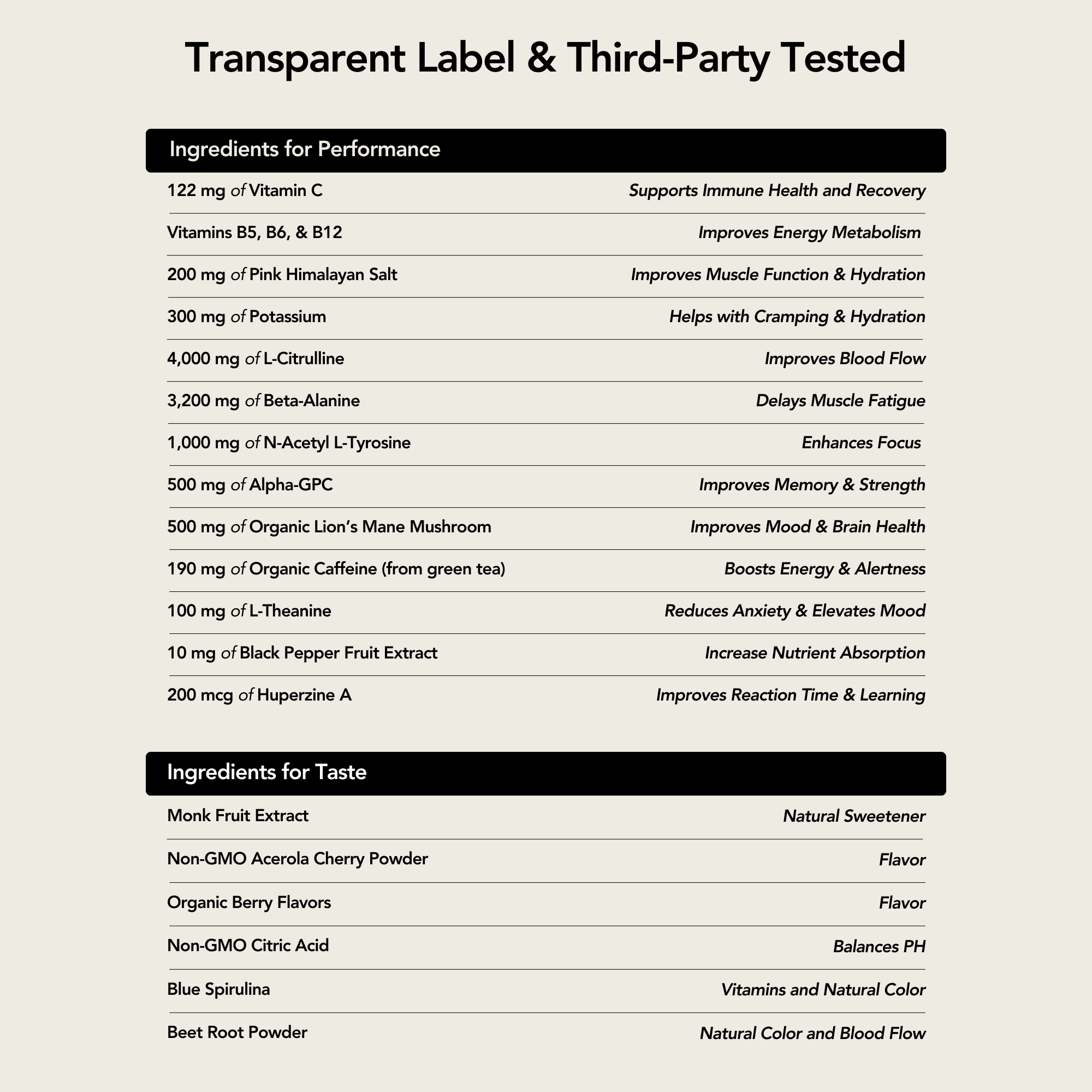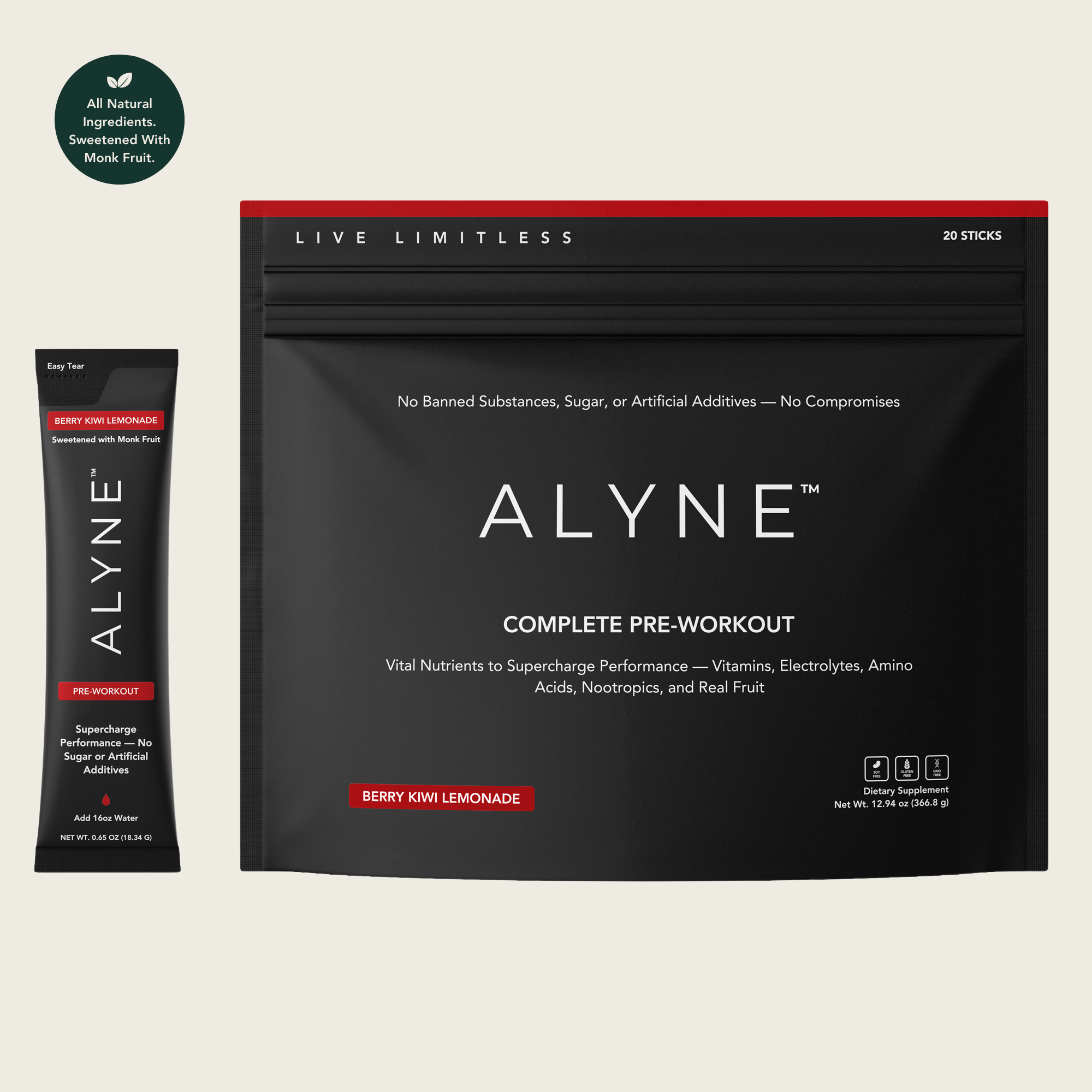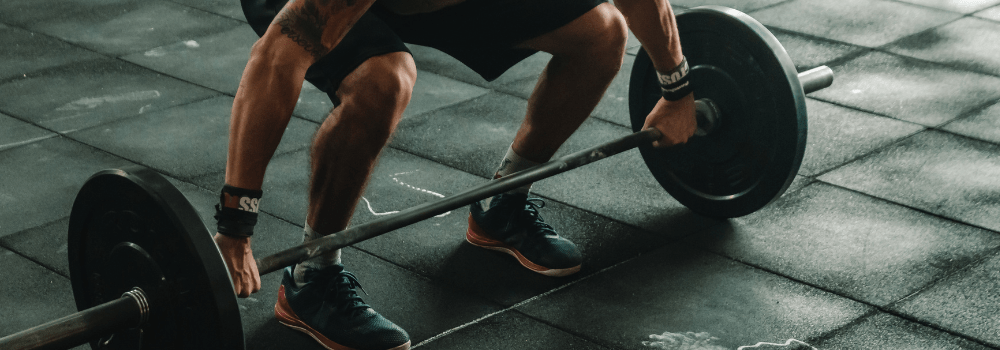Since launching ALYNE, we have received a shocking number of messages from women asking if our pre-workout was a good fit for them. We were not expecting this kind of outreach; however, upon more reflection, it made sense.
The nutrition and supplement industry, but especially pre-workout, is overwhelmingly marketed to men. From the overtly masculine names to the visually aggressive branding, it is not surprising that many pre-workout products potentially alienate women.
Despite the overwhelmingly masculine branding of some pre-workout products, the best pre-workout for women is likely to be the best pre-workout for men. And vice versa. Ultimately, the goal when looking for a pre-workout should not be to find the “best women’s pre-workout”. The goal should be to find the product that best suits your unique fitness and health goals as well as possible.
Nevertheless, there may be a few ingredients that women specifically want to pay more attention to in addition to some basic pre-workout guidelines to follow.

Pre-Workout Supplement Basics:
Pre-workout is a type of sports nutrition supplement usually taken before engaging in physical activity to enhance exercise performance. Pre-workout typically comes as a powder and contains a medley of ingredients like caffeine, beta-alanine, and amino acids, designed to work synergistically, boosting energy, and enhancing focus, strength, and endurance.
Factors That Make For A Good Pre-Workout:
- Active Ingredients & Doses: The most important factor contributing to the effectiveness of a pre-workout is the number and variety of active ingredients and the amount of each ingredient (dose). A broader variety of ingredients means more potential benefits can be realized. However, the dose determines the ultimate effectiveness of each ingredient. Furthermore, almost all ingredients must meet or exceed a minimum dose to have some performance benefits.
- Transparent Labels: All active ingredients and their doses should be listed clearly on the supplement panel. Some brands use proprietary blends, which means that the doses of the individual ingredients aren't listed, leaving you unaware of what you are truly purchasing and ingesting. For example, a hypothetical product may have a 500 mg “energy blend” of caffeine, taurine, and B vitamins but without specific ingredient doses, it's impossible to gauge the effectiveness.
- Ingredient Cleanliness: Pre-workout supplements almost always contain non-active ingredients to improve the respective taste and texture. Some brands use low-quality additives like fillers, and gums which offer no nutritional value and can dilute the potency of the active ingredients. For taste and sweetness, many pre-workouts include artificial sweeteners, such as sucralose and aspartame, which can cause digestive discomfort and long-term health risks. New research sponsored by the World Health Organization links artificial sweeteners with increased risks of type 2 diabetes, heart diseases, risk of mortality in adulthood among other conditions. [1]
- Independent, Third Party Testing: Third-party testing is essential to independently verify the quality, purity and potency of supplements. This process ensures that supplements meet regulatory standards, and confirms the presence of stated ingredients in the correct amounts. Testing also detects impurities such as heavy metals and pesticides, contributing to the overall safety and consistency of the product.
- Bioavailability: Bioavailability refers to how efficiently the body absorbs and uses a substance. In pre-workout supplements, high bioavailability ensures proper absorption, leading to timely energy release and minimal waste. Prioritizing bioavailability enhances overall efficacy, boosting focus, energy, and endurance.
- Packaging: Pre-workout supplements usually come in powder form in tubs with a scoop. However, this packaging is bulky, not easy to carry around, and can easily spill. Furthermore, pre-workout powder absorbs moisture easily, leading to clumping when exposed to air. Stick packs offer convenience and a moisture-resistant barrier for each serving.
Key Pre-Workout Ingredients:
No two pre‑workout formulas are alike. Each pre-workout supplement has a distinctive formula, which translates into distinctive benefits to the consumer. You may want to focus on boosting energy, increasing endurance, improving focus, or a combination of these. As such, finding the right pre-workout that’s specific to your fitness needs can be difficult to find, and it might take some time, but generally you want to see at least some of these commonly recommended ingredients:

- Caffeine: A natural stimulant that can enhance energy levels, focus, and endurance during workouts. [2]
- Beta-Alanine: An amino acid that helps buffer lactic acid buildup, reducing muscle fatigue and supporting longer, more intense workouts. [3]
- Nitric Oxide Boosters: Such as citrulline and beetroot extract, can dilate blood vessels and increase blood flow thereby improving oxygen delivery and nutrient absorption in muscles. [4]
- Vitamin B Complex: A group of eight B Vitamins that help with energy metabolism. B Vitamins can help increase energy levels and reduce fatigue to improve overall workout performance. [5]
- Nootropics: Nootropics are substances that enhance cognitive function and promote brain health. Popular nootropics such as Lion's Mane and Alpha GPC can enhance focus and mental sharpness while exercising. [6]
- Electrolytes: Sodium, potassium, and magnesium are needed to maintain proper hydration and support muscle function. [7]
For a more detailed evaluation of most of the ingredients in the top pre-workout products, along with their respective minimum effective doses, see our blog post here.
Ingredients to Approach With Caution For Women:
For women considering pre-workout supplements, there are certain ingredients they may want to approach with caution:
- Caffeine: Though caffeine offers an energy boost, too much can result in jitteriness and anxiety. If taken too close before going to sleep it can also disrupt sleep cycles. For increased athletic performance, consuming between 2 to 3 mg of caffeine per kilogram of body mass has been found to be effective without the aforementioned side effects. The average weight of women in America over the age of 20 according to the CDC is approximately 170 lbs or 77 kg. Therefore, a pre-workout with 150-200 mg of caffeine per serving may make for a better pre-workout for women. Many of the pre-workouts are geared towards men and contain 250-400mg of caffeine per serving, which may result in jitteriness. [8], [9], [10]
- Creatine: Creatine is a compound that comes from three amino acids, which enhances ATP production, improving strength and power output during short bursts of intense activity. Creatine, while well-researched and generally considered safe, is known to have some side effects such as bloating, and weight gain due to increased water retention. [11]
- Hormonal Modulators: Some pre-workouts feature so-called hormonal modulators, substances that are thought to help maintain hormonal balance or enhance muscle growth. One example is DHEA (dehydroepiandrosterone), a precursor to both estrogen and testosterone. Some formulas also include herbal extracts like fenugreek for their alleged testosterone-boosting effects. The impact of these ingredients on hormone levels in women is not well-understood and the result could hold risk for hormonal disturbances and unwanted side-effects. [12]
Ingredients to Avoid:
Similarly to how there are some ingredients that should almost always be included in pre-workout supplements there are also some ingredients that should be avoided. Artificial sweeteners (e.g. sucralose, aspartame), and sugar alcohols (e.g. erythritol) enhance taste but have been associated with gastrointestinal distress, asthma and cancer. Synthetic stimulants (e.g. DMAA, DMBA) can have serious side effects on the central nervous system. Sticking to a non-GMO, filler-free and naturally sweetened pre-workout is the easiest way to mitigate these risks. [13], [14]
For a more detailed review of ingredients you should avoid in your pre-workout read our blog on natural pre-workouts here.
Takeaways:
While the fitness industry often targets men with aggressive marketing and packaging, the best pre-workout options are typically suitable for both men and women. However, certain ingredients, such as caffeine and hormonal modulators, may warrant extra caution for women due to potential side effects. Prioritizing transparency in labeling, selecting clean and effective ingredients, and opting for products that undergo independent testing can help ensure a safe and beneficial pre-workout experience.
So where can you find the best pre-workout for women? At ALYNE, we've meticulously crafted what we believe to be the ultimate pre-workout formula for both women and men. Our formula features just the right amount of caffeine, at 190 mg per serving, making it suitable for all fitness activities and most individual sensitivities. This balanced dose provides a clean and sustainable energy boost, without the unwanted jitters or crashes often associated with higher caffeine levels.
In addition to 190 mg of caffeine, our pre-workout is packed with 15 active ingredients at peer-reviewed doses, carefully selected to support a wide range of benefits across strength, endurance, and cognitive performance. With over 500 mg of electrolytes and six nootropics specifically chosen for athletes and high-performing individuals, our formula goes beyond mere energy enhancement. It's designed to help you stay focused, make quality decisions under stress, and push through even the toughest workouts with ease.
Our pre-workout is free from sugar, sugar alcohol, stevia, artificial additives, GMOs, glyphosate, gums, and fillers. With a fully disclosed label and third-party testing, every serving of ALYNE pre-workout is backed by science and meets the highest safety and efficacy standards. Learn more about our pre-workout now!











